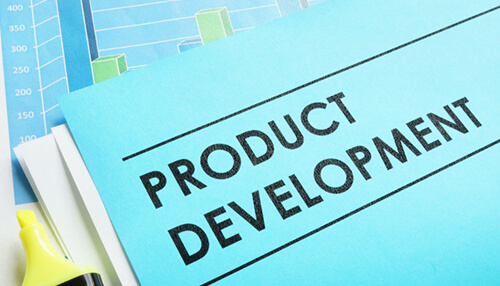Importance Of Product Development Strategy In Business
Product development strategy is crucial as it involves market research in developing a plan and ensuring success by selling the same. The overall strategy includes techniques and methods to use during the product development stages. This strategy helps overcome obstacles and allows concentrating on successful strategies. Planning to develop products helps businesses grow and to adjust existing products.
7 Ways In The Product Development Strategy Process
1. Brainstorming product idea
The foremost step is in generating an idea for a product. To get product ideas, speak to employees, particularly people who deal regularly with customers. Surveying customers on existing products will give brainstorming product ideas on going through their feedback. Examine your industry niche and find out the areas lacking products. Perform market research and develop an online survey for social media fans for customers. List all the new product ideas and settle for the right idea.
2. Evaluate the ideas
Having a list of ideas as a product development strategy is not enough. You may share with decision-makers and the management team in the company. Discuss each idea, the pros, and the cons, and narrow the list to a handful of ideas. Work on the potential of ideas to generate revenue, time, and resources to create products.
3. Use Social Media
A powerful tool is social media to solicit feedback, until making public your product idea. Having a strong presence on social media on Twitter, Facebook, or similar sites, is beneficial. You can post images or descriptions of the concept and ask visitors for likes or comments. At business sites, professional colleagues such as LinkedIn are useful and knowledgeable input sources. You may use the social tools and raise funds for the projects, or see if there are other sources to fit the objectives of the company.
4. Market Assessment and feedback
Seek feedback from partners, employees, and customers on appealing ideas. Ask customers through phone calls or email for feedback. Send email to employees and partners asking for the most valuable idea on the product development. Shortlist and bring the list to one or two product ideas.
Analyze all the product ideas considering the business perspective and market research. Determine, if any, competition exists for similar products. Consider the product demand, estimate costs in affiliation with the product, including operational and development costs, and determine the profit margin.
5. Sample and Marketing
Develop a sample of the business plan product and share it with key partners and good customers. Request them to provide feedback. Your marketing team should work on the feedback. It is necessary to develop marketing campaign ideas and marketing messages, such as websites, email campaigns, posters, or billboards. You may base the acceptance on the positive comments from partners and customers to evaluate the sample. At the same, work on the negative points seeking satisfaction.
6. Market Testing
Consider the feedback, adjust the sample as a business strategy, and if necessary, develop a new version. You may develop for market testing additional samples. In select areas, release a small product. See if the product sales are good and assess whether the sales are low or high. Check the effectiveness of marketing messages and assess the price. A small launch determines the needs before the official launch.
7. Set for Launch: The Role of Product Development Strategy
Start the product launch first round of production. Evaluate the number of products to get into production as per the product demand and market testing. Work on the business strategy, speak and advertise to the product distributors and check if the product is in demand to see a sale in the stores.



